The expected flurry of activity post Queen’s Speech didn’t disappoint this week. Speculation about fees and funding, the Skills Bill, an OfS quality measure (which is not going to be used for regulation, so what is it for), as the new OfS chair sets out a new list of priorities, hot on the heels of the REF submissions, a new review has been announced to consider what the next REF might look like, in parallel to the existing review of research bureaucracy, and there is more on last week’s Free Speech Bill…. and now we are allowed to sit inside with a coffee to digest it all (and given the weather, there isn’t much temptation to sit outside). Other beverages are available, of course.
Government support for universities in the pandemic
The IFS have a report out: COVID-related spending on education in England
Research Professional report on the report:
- It may not surprise folks in universities that higher education seems to have been the poor relation when it comes to government largesse. This is, arguably, a reversal of universities’ past relationship with the Treasury and an ominous sign of things to come.
- ….The IFS identifies £4.3bn of the £160bn as having been spent on education in England. Of that, only £365 million has been earmarked for higher education—this does not include loans for research allocated by the Department for Business, Energy and Industrial Strategy.
- … Of the £365m directed towards universities, £70m has been new cash for student hardship.
- ….Of the total earmarked for universities, £300m is for restructuring insolvent institutions, for which, as the IFS points out, the government has received no applications. As the IFS dryly puts it, this suggests that “actual spending might turn out to be quite low”. It is hard to go lower than zero, unless universities were to start paying the Department for Education for the privilege of being ignored by the government.
- That leaves around £70m of late-in-the-day student hardship money as the only additional cash directed towards universities in England during the pandemic. As has been pointed out, that amounts to around £45 per student, which is £14.20 less than one week’s Jobseeker’s Allowance for someone under the age of 24.
- In addition, the business department has made £280m available for research funding, £80m of which comes from elsewhere in the department’s budget due to Covid-related underspending. That £280m Sustaining University Research Expertise package went towards extensions to grants covering researcher salary costs and laboratory equipment.
- Not included here is the amount for government loans covering non-publicly funded research, which readers will recall are tied to structural reforms in universities, such as pay cuts for senior managers. As the IFS puts it, once again, “take-up is likely to be very low”. At present, £32m is set aside for the scheme, of which £22m is for capital expenditure.
- We also know that some universities have taken out loans from the Bank of England’s Covid Corporate Financing Facility, jointly run with the Treasury. …These figures do not appear in the IFS analysis.
- Then there is the furlough scheme, widely used by universities, through which £77m was spent mothballing 25,000 jobs across higher education employers. Again, these numbers are not part of the IFS calculations.
Fees and funding
After the Queen’s Speech it is not surprising that attention turned to fees and funding over the weekend. Research Professional have good coverage of what happened: It all started on Friday, when the Conservative Home website published a lengthy blogpost by education secretary Gavin Williamson…“The record number of people taking up science and engineering demonstrates that many are already starting to pivot away from dead-end courses that leave young people with nothing but debt,” Williamson writes in his piece. For BU readers we’ve done a little summary of how we got here and what might come next.
David Kernohan from Wonkhe has a critique of the Secretary of State’s argument in this blog and looks at just one arts cohort as an example:
- Sources close to Gavin Williamson suggest in The Sunday Times that some arts graduates earn “as little as £12,000 a year”. …. I’ve gone one better and found 20 female printmaking graduates earning a median salary of £6,200 a year after graduation. Seeing a small group median like that makes the principal flaw of LEO clear – these graduates are almost certainly working part-time. ….. And LEO does not discriminate between full and part time work.
- Secondly, these are median values. ….The upper quartile is so much higher than the median that earnings may be substantially higher in a couple of cases – suggesting two of our talented young female printmakers had sadly given up on their dreams and gone for a “graduate job”.
- So which of our female printmakers have hit a dead-end, a year after graduation? The four who aren’t working at all, who may be undertaking further study or making and selling art full time? The eight or so working part-time to support their art? Or the ones that have put their practice on hold (or given up entirely) to work in media sales because our society doesn’t seem to think it needs artists who can work, eat, and pay rent?
- Should any of them not have done a degree?. … If the post-18 review started as a way to win the hearts and minds of students and those who have students (or potential students) in their lives, it has ended in a clumsy and misguided attempt to make subjects that people want to study in their thousands economically unviable to teach. Quite what, or who, this is “levelling up” is unclear.
Research Professional continue:
- The “nothing but debt” phrase also showed up in a Sunday Times article over the weekend. That piece claimed that in line with the recommendations of the Augar review of post-18 education funding, university tuition fees “could be cut from £9,250 to a maximum of £7,500, according to a government consultation which begins next month”.
- It seems that even though Augar himself appeared to disown this particular recommendation; it is far from dead in the water—as was previously thought.
- The Sunday Times reports: “The cost of science degrees would be topped up by extra government funding, but critics fear arts and humanities subjects, such as languages, philosophy, theology, history and creative arts, would disappear at many universities.”
- There is no date yet for the launch of the consultation in question, but the paper says that this follows “growing concern in the Treasury” about the affordability of the student loan scheme given that a large proportion of loans are never paid back.
Meanwhile ex-Universities Minister, Chris Skidmore, who takes a more pro-HE view in some arguments, wrote for Conservative Home on Monday morning: Student finance? It’s the interest rate, stupid. Skidmore gets to the nub of the issue quickly – that changes are coming and have to be paid for somewhere – so HEIs should get on board and place themselves well for the change. And he reminds the Government that the reason fees aren’t repaid is because the interest levels are so high. Tuition fees are a hot spot for the Government because (1) they believe(d) Labour’s no fees policies are attractive and draw voters away from the Conservatives:
- But if we are to reduce university fees, then there is also an important policy lever which the Government should also be looking to change, which I believe would have far greater impact on individual lives— and in turn far greater support… We need to look again at the interest rate charged on student loans, which any student or parent will tell you is out of all proportion to the reality of current interest rates.
Bear in mind the cost to the public purse for tuition fees became much more of an issue when the Office for National Statistics reclassified the student debt to count it in with the Government’s debt. Prior to this Jo Johnson (ex-Universities Minister) often defended the removal of student grants by explaining that if the student didn’t benefit from their graduate education and couldn’t afford to repay their loan it was written off. It was a deliberate, progressive subsidy, we were told. And Jo Johnson didn’t want to restrict choice of subject either. How things have changed.
Skidmore points out the problems with the new approach:
- Science degrees cost more than the current £9,250 a year to provide, with most being subsidised by arts, humanities and social science degrees. Unless careful thought is given to the impact of the unit of resource, what seems an attractive headline offer might in fact backfire – especially if it results in a loss of opportunity for future students in regions of the country who find that their local university is no longer able to provide the course provision they wish, not only in the arts and humanities, but in science degrees, too.
- In addition, out of the current fee level, universities themselves invest around over £800 million a year in improving access and participation from some of the lowest socio-economic groups to attend university. With a reduction in fees, there is also a risk that the ability to reach out to the most disadvantaged in society is also reduced.
And he tells us his ResPublica Lifelong Education Commission is looking into alternatives:
- … we should be investigating new methods of funding reskilling and upskilling. The success of research and development tax credits in generating this activity points to an opportunity for how companies could be rewarded for investing in the human capital of their employers, especially given the opportunity to close the productivity gap that lifelong learning might offer.
Meanwhile don’t miss the comments to Skidmore’s article even if you don’t read the actual piece. Although perhaps not if you are concerned about your blood pressure.
The Skidmore article triggered some discussion within HE policy circles as it highlighted the oft ignored distinction between tuition and living cost (maintenance) loans: it is one thing to say the loan system is unaffordable, another to say it is unaffordable because too many poor students have to eat while they study. Quite timely given the NUS hardship research published this week, more on this below.
Research Professional speculate about what a fees cut would do to research prospects and the university recruitment portfolio:
- While a tuition fee cut would mean less income for all universities, it would affect the research effort in post-1992s much less. ….Post-1992s will be badly hit by any cuts and there will be job losses, with remaining staff asked to take on more teaching. However, the islands of research excellence within them—which rely heavily on the quality-related funding they generate—will be less badly affected than in other types of university.
- ….Russell Group universities may review their own subject mix. With little profit to be derived from classroom teaching, we could see a swing away from the heavy recruitment that has been taking place in these disciplines.
- …The squeezed middle will be those universities that attract less quality-related and less external funding but that rely on a cross-subsidy for research from teaching. Under these circumstances, there will be pressure to both lose staff and increase teaching loads in the arts because of the fee cut, and to reduce research activity across the board because of the loss of cross-subsidy.
- The tectonic realignment that would take place as a result of a tuition fee cut might then see greater research concentration in the big civics, with a transfer of students in the opposite direction as those universities loosen their grip on undergraduate recruitment, once more looking to manage reputation and league table position through quality rather than quantity of applicants.
- ….The big implication here is that the wider research effort in English universities would take a significant knock. Surely this is the opposite of what the government intends through an innovation-led form of levelling up and post-Covid recovery—so much for being a scientific superpower.
The article then goes on to highlight how the student experience wouldn’t necessarily be better nor would students repay their loans more frequently nor quicker. It is worth a read.
Research
Future Research Assessment: UKRI have launched the Future Research Assessment Programme:
- This significant piece of work will… explore possible approaches to the assessment of UK higher education research performance.
- Through dialogue with the higher education sector, the programme seeks to understand what a healthy, thriving research system looks like and how an assessment model can best form its foundation. The work strands include evaluation of the REF 2021, understanding international research assessment practice, as well as investigating possible evaluation models and approaches, looking to identify those that can encourage and strengthen the emphasis on delivering excellent research and impact, and support a positive research culture, while simplifying and reducing the administrative burden on the HE sector.
- This programme of work is expected to conclude by late 2022.
Details – the international advisory group and their terms of reference; the programme board and their terms of reference. Research Professional cover the announcement. While there aren’t any additional details, their content explores the panel and talks about the review.
Horizon Europe: The European Scrutiny Select Committee have requested the Government explain how Horizon Europe will be funded. Press release, report document, committee information.
- It is estimated that UK association with Horizon Europe would require a financial contribution of £12.7 bn. for the seven years from 2021 to 2027 inclusive. This is a gross figure, before deducting items such as any subsequent inflow of funds back from Horizon into UK scientific projects.
- UK scientific researchers have expressed concerns that the government might expect much of this funding to come from existing domestic research budgets.
- The government has made proposals to pay towards some of the costs of Horizon Europe, but not all of them. The European Scrutiny Committee has therefore written to the Minister for Science, Research and Innovation, Amanda Solloway MP, seeking clarity on the government’s proposals. The Committee asked if the Minister could please tell them how the UK’s participation in Horizon Europe would be funded [within 10 days].
- So no new news but pressure to reveal plans builds within parliament.
Quick News
- The International Energy Agency (IEA) launched a landmark special report, setting out the world’s first comprehensive roadmap for the global energy system to rapidly boost clean energy deployment and reduce fossil fuel usage. Contact us if you’d like a summary.
- The BEIS Committee held a session on levelling up and the post-pandemic recovery. The first session covered the industrial strategy, the definition of levelling and key metrics and related policies. The second session focussed on the Government’s industrial decarbonisation strategy and wider decarbonisation issues. Contact us if you would like to read a summary of the session.
- Record numbers of trademark and registered design applications have been made post-Brexit. There was a dip in numbers at the outset of Covid in spring 2020 but numbers grew substantially by summer 2020.
- Parliamentary Question: Encouraging international students to complete their PhD in the UK.
- Research Professional have a blog Know your Audience explaining how to tailor research grant applications to achieve success.
- COP26 President Alok Sharma speech: The vital role of the academic community in delivering COP26 aims.
- The Royal Society have set out twelve critical technologies and research areasthat should be prioritised in national roadmaps for achieving ‘net zero’ greenhouse gas emissions. The new briefing reports aim to rapidly accelerate research, investment and deployment in areas that will become increasingly important across the next 30 years.
- Kit Malthouse, Home Office Minister of State for Crime and Policing, has published a written ministerial statement announcing the Appointment of the Forensic Science Regulator, Gary Pugh OBE.
- The National Centre for Universities and Business has published a report on the impact of COVID on business R&D. It specifically investigates the impact on businesses’ R&D and innovation activities and their collaborations with universities.
- Societal impact: A longitudinal research studywill follow babies born in the 2020s over many decades aiming to understand how societal circumstances and events affect them. A £3 million investment, made by the Economic and Social Research Council (ESRC), part of UK Research and Innovation, will allow UCL and other researchers to develop a two-year-long birth cohort feasibility study. This study will develop and test the design, methodology and viability of a full-scale Early Life Cohort Study that is likely to follow participants for more than 70 years, starting from 2024.
- Business Secretary, Kwasi Kwarteng, has appointedVikas Shah and Stephen Hill as non-executive board members at the Department for Business, Energy and Industrial Strategy. They will help to steer the board “as BEIS navigates key issues including the economic recovery from coronavirus [and] efforts to combat climate change and promote science, research and innovation”. There will be another competition in the summer to appoint a board member to lead on energy and climate change policy.
- Turing Fellowships – the Government has published guidanceon the Turing AI Fellowships, (£46 million initiative aimed at attracting and maintaining the best talent in artificial intelligence). The full document, including the Turing AI Fellows supported by funding from the UK government, can be accessed here.
Parliamentary News
You can read the full text of the Queen’s speech debate relating to education: A Brighter Future for the Next Generation.
Labour confirmed their shadow line up for Education:
- Shadow Education Secretary: Kate Green
- Peter Kyle (Schools)
- Matt Western (Universities)
- Toby Perkins (Apprenticeships & life-long learning)
- Tulip Siddiq (Children & Early Years)
- Child Poverty Strategy – Wes Streeting
Here is the new Scottish Government Cabinet:
- Nicola Sturgeon – First Minister
- John Swinney – Deputy First Minister
- Kate Forbes – Cabinet Secretary for Finance and the Economy
- Humza Yousaf – Cabinet Secretary for Health and Social Care
- Shirley-Anne Somerville – Cabinet Secretary for Education and Skills
- Michael Matheson – Cabinet Secretary for Net Zero, Energy and Transport
- Keith Brown – Cabinet Secretary for Justice
- Shona Robison – Cabinet Secretary for Social Justice, Housing and Local Government
- Angus Robertson – Cabinet Secretary for the Constitution, External Affairs and Culture
- Mairi Gougeon – Cabinet Secretary for Rural Affairs and Islands.
Skills and Post-16 Education Bill
The Skills and Post-16 Education Bill has been introduced – it will be starting its journey in the House of Lords. We are waiting for a date for the second reading (this is when the actual debate and discussion of the Bill begins); it probably won’t be discussed until June. The Bill will cover:
- local skills improvement plans;
- further education;
- the functions of the Institute for Apprenticeships and Technical Education and relating to technical education qualifications;
- to make provision about student finance and fees;
- to make provision about assessments by the Office for Students;
- to make provision about the funding of certain post-16 education or training providers.
Here is the Government’s press release: New legislation to help transform opportunities for all – The Skills and post-16 Education Bill will support vital reforms to post-16 education so more people can gain the skills needed to secure great jobs.
You can read the full text of the Bill, the accompanying explanatory notes and the impact assessment. Or the shorter version is that the Bill provisions currently:
- Provide for a statutory underpinning for local skills improvement plans, introducing a power for the Secretary of State for Education to designate employer representative bodies to lead the development of the plans with duties on providers to co-operate in the development of and then have regard to the plans
The key policy objectives of local skills improvement plans, as part of the Skills Accelerator, are to:
- Enable employers to clearly articulate the priority strategic changes they think are required to technical skills provision in a local area to make it more responsive to the skills needs.
- Enable a process whereby FE providers respond better collectively to the labour market skills needs in their area.
To frame this policy intent in legislation, the Bill measure focuses on:
- giving the Secretary of State the ability to designate employer-representative bodies (ERBs) to develop local skills improvement plans, ensuring ERBs have regard to written guidance and providing them with the necessary influence to develop local skills improvement plans; and
- requiring providers to co-operate with the ERB in developing the local skills improvement plan and have due regard to this when considering their technical education and training offer
- Introduce a duty for all further education corporations, sixth form college corporations and designated institutions to review how well the education or training provided by the institution meets local needs, and assess what action the institution might take to ensure it is best placed to meet local needs. This places a duty for all governing bodies to keep their provision under review to ensure that they are best placed to meet the needs of the local area. This duty will form part of college planning from academic year 2022/23…
- Introduce additional functions to enable the Institute for Apprenticeships and Technical Education (“the Institute”) to define and approve new categories of technical qualifications that relate to employer-led standards and occupations in different ways, and to have an oversight role for the technical education offer in each occupational route, including mechanisms to manage proliferation.
- Ensure that the Institute and the Office of Qualifications and Examinations Regulation (“Ofqual”) maintain a streamlined collaborative system for approval and regulation of technical qualifications.
- Giving the Institute powers to determine new qualification categories and approve qualifications against associated criteria in the future….Putting the mechanisms in place to ensure the qualifications market delivers high quality technical qualifications based on employer-led standards and employer demand.
- Giving the Institute powers that could allow it to charge for approval and to manage proliferation.
- Introduce specific provision reflecting lifelong learning entitlement policy which aims to make it easier for adults and young people to study more flexibly – allowing them to space out their studies, transfer credits between institutions, and take up more part-time study. The proposed legislation modifies the existing regulation-making powers in the Teaching and Higher Education Act (THEA) 1998 so as to:
- make specific provision for funding of modules of higher education and further education courses, and the setting of an overall limit to funding that learners can access over their lifetime,
- make clear that maximum amounts for funding can be set other than in relation to an academic year.
- Enable the Secretary of State for Education to make regulations for the purpose of securing or improving the quality of Further Education (“FE”) initial teacher training;
- Reinforce the Office for Students’ ability to assess the quality of higher education providers in England, and make decisions on compliance and registration by reference to minimum requirements for quality. [we’ll talk more about this in the section on OfS priorities below]
- Enable the Secretary of State for Education to make regulations to provide for a list of post-16 education or training providers, in particular Independent Training Providers (“ITPs”), to indicate which providers have met conditions that are designed to prevent or mitigate risks associated with the disorderly exit of a provider from the provision of education and training.
- Extend statutory intervention powers applicable to further education corporations, sixth form college corporations and designated institutions under the Further and Higher Education Act 1992. This measure will enable the Secretary of State for Education to intervene where there has been a failure to meet local needs, and to direct structural change where that is required to secure improvement (such as mergers); and
- Make amendments to clarify and improve the operation of the FE insolvency regime for further education bodies, relating to the use of company voluntary arrangements, transfer schemes and the designation of institutions.
Wonkhe have a blog picking out matters to note within the Bill – it dismisses the Bill as poorly thought out and without substance. The first comment to the blog (Phil Berry) makes a really important point on the lifelong learning funding– For this to truly work there needs to be a complete rethink of how student funding works with the removal of the distinctions between full-time and part-time and a move to a credit based system. It seems to be a bolt-on at the moment.
More OfS priorities
The new chair of the OfS spoke at a UUK meeting. You can read the press release here and the full speech here. He set out four key principles:
- nobody with the talent to benefit from higher education should find that their background is a barrier to their success
- higher education students from all backgrounds and on all courses should expect a high quality experience, and that high academic standards must be maintained
- universities must continue to take urgent steps to tackle harassment on campus
- we should, as an efficient and effective regulator, take steps to reduce unnecessary regulatory burden wherever we can
On widening participation, he said this is key to the levelling up agenda. You’ll recognise a theme here from a few years ago when there were thoughts of making school sponsorship mandatory…where is this going now?
- Universities, working with schools, …. need to continue to reach out – especially to those towns and coastal communities where people feel forgotten – and to show people there that university is for them too. By casting their nets wide, searching for talent where opportunity may be in short supply, universities have the power to transform lives. And universities have a critical role in developing that talent also, doing the hard graft with schools and pupils to drive up attainment and achievement from an early age.
On quality, he promised the outcome of the quality consultation shortly. As expected, quality is defined by outcomes (specifically, employment outcomes) and continuation, and they are “sharpening their regulatory tools”. That may be a reference to the Skills Bill, which apparently is going to give them new powers to enforce their quality framework. [In the meantime, the OfS have launched their new metric which uses, guess what, continuation and employment outcomes to provide a single combined score (called, creatively, “Proceed”) – see more in the separate section below.]
- Let me be clear though. Broadening access to university cannot be done by lowering standards. I do not accept the argument that levelling up can involve any reduction in the academic excellence and rigour of which our higher education sector is rightly proud. It is incumbent on our universities to play their part in raising standards and attainment both at the point of access and throughout the higher education experience.
- ….When students do begin their degrees, they are right to expect that they will receive high quality teaching and a springboard to a good career. Education for its own sake is to be commended and protected, but in doing so we should recognise that – for most students – securing a rewarding career is one of the most important factors in deciding what, where and how to study.
- While most higher education teaching in England is good or excellent, good quality is not universal. Nobody embarks on a degree expecting to drop out, or to find themselves no better off months – or even years – after they graduate. Courses with high drop out rates and low progression to professional employment let students down, and we shouldn’t be reticent in saying so, or taking action.
- …Most universities and other higher education providers offer good quality provision. Many will comfortably out-perform any numerical baselines we set – and will see regulatory burden fall as a result. But, where standards slip we stand ready to intervene. We will set out our next steps on quality shortly, sharpening our regulatory tools as necessary to address these issues and help ensure that students can count on good quality higher education.
[Just to finish the point on the Skills Bill, the relevant bit is section 17:
In section 23 of the Higher Education and Research Act 2017 (assessing the quality of, and the standards applied to, higher education), at the end insert—
“(4) The factors that may be taken into account for the purposes of an assessment…. of the quality of higher education provided by an institution include the student outcomes of the institution.
(5) The student outcomes of an institution may be measured by any means (whether qualitative or quantitative) that the OfS considers appropriate, including by reference to the extent to which—
(a) persons who undertake a higher education course with the institution continue to undertake that course, or another course at the same or a similar level, after a period of time,
(b) persons who undertake a higher education course with the institution are granted an award of a particular description by that institution,
(c) persons who are granted an award by the institution undertake further study of a particular description, or
(d) persons who are granted an award by the institution find employment of a particular description by virtue of that award.
(6) The OfS may, from time to time, determine and publish a minimum level in relation to a measure of student outcomes which all institutions to whom the measure is applicable are expected to meet.
(7) The OfS is not required to determine and publish different minimum levels in relation to a measure of student outcomes in order to reflect differences in—
(a) particular student characteristics; (b) the particular institution or type of institution which is providing higher education;
(c) the particular higher education course or subject being studied;
(d) any other such factor. …
So we get to harassment. He talked about the new statement of expectations and promised, to look at options for making compliance a regulatory condition. He did not mention freedom of speech (strange, for such a topical issue and with the OfS being promised sweeping new powers in the new Bill). He did, however, reconfirm the position on anti-Semitism:
- One straightforward action to take is for all universities to sign up to the IHRA definition of antisemitism. The definition is important in helping us all to interpret and understand antisemitism and I strongly urge any university that hasn’t signed up to do so without delay. Those universities that have signed up must – of course – continue to be alert to antisemitic incidents and have clear measures in place to ensure that Jewish students are free to study and enjoy university life without fear of harassment.
And so to bureaucracy.
- Reducing unnecessary burden will be a priority for me. [This one is a stretch when the new quality regime proposed onerous new data and reporting requirements, the Freedom of Speech Bill sets up another layer of reporting and monitoring and we are about to be consulted on the next iteration of the TEF. While the TEF is going to be better than it might have been (no subject level) it will be mandatory and demanding to complete.]
- We need to get the balance right between ensuring students and taxpayers enjoy the benefits of regulation without universities experiencing an overly bureaucratic process that detracts from their core purpose – delivering excellent teaching and research. [I guess it’s all about perspective – if it’s necessary and beneficial, then it doesn’t matter if, in fact, it increases the overall burden].
- … as a first step, we will publish next week the details of a new key performance measure that will set out transparently whether our work is reducing or increasing reducing regulatory burden. [Well, that’s ok then].
So with this in mind, Nicola Dandridge (CEO of the OfS) has blogged about their approach to managing the regulatory burden. She says that they are committed to getting the balance right between the benefits and burden of regulatory and that [be prepared to find some of these underwhelming…]:
- producing plans for each of the last two years has imposed significant administrative burden. Data released today shows no reduction in burden at this stage. However, this will change in future as we have increased the length of access and participation plans to five years
- we have reduced our data requirements. We now no longer require data about estates or non-academic staff, and providers were required to submit at most 15 data returns last year, down from 18 the year before
- We have also successfully reduced – where appropriate – enhanced monitoring requirements. There were a total of 468 conditions subject to enhanced monitoring across all providers in March 2020, and we reduced this to 406 in November 2020, despite increasing the number of registered providers overall.
- we have suspended random sampling
- ….and committed to reducing providers’ fees by 10 per cent in real terms over the next two years. Today’s measures show that the combined fees of OfS, HESA and QAA cost providers an average of less than £20 per student last year.
And – tada – the new KPI is revealed. With only one or two years of data, the graphs are not very exciting, but you might like the ones under (4) “understanding our regulatory approach”.
- Submitting data and information.
- Complying with enhanced monitoring requirements.
- Developing and agreeing access and participation plans.
- Understanding our regulatory approach.
- The OfS published around 420,000 words in regulatory documents in in each of the past two years. Around 60 per cent of these documents met our readability target
- Paying regulatory fees.
- Providers paid an average of under £20 per student to be registered with the OfS in 2019-20 (providers registered in 2019-20 paid an average of £19.91 per student in regulatory fees) [there is a commitment to reduce fees by 10% by 2022-23]
Research Professional ran an article on the regulatory burden. Wonkhe have a blog too: The OfS measures its own regulatory burden.
Proceed: Graduate Prospects Measure
In the context of all this talk about closing down courses and capping fees, if drop out rates and employment statistics aren’t up to scratch, the OfS have published an experimental new measure through which they intend to show students’ likelihood of securing professional level employment or embarked on further study in the year after they graduate. The measure is based on projected data for full-time first degree students who complete their studies (completion rates) and the progression of recent graduates to employment, further study and other activities (graduate outcomes); for short it is called Proceed. This is the second release of the measure as the OfS has tweaked it since its first outing in December in response to cross-sector feedback.
The OfS press release states new measure shows substantial differences in likely job and study outcomes for students stating it reveals substantial differences between individual universities and other higher education providers, in different subjects, and in different subjects at individual universities. The OfS anticipates prospective students will consult the measure to make informed choices about what and where to study and they say they have no intention to use it in regulation.
We know that latter part is probably true – because this data is benchmarked, and the quality consultation and the new provisions in the Skill Bill confirm their intention to use non-benchmarked data to regulate. So this new metric is a much softer, friendlier approach than the one we are expecting. It also looks remarkably like something that might crop up in the new TEF – using the government’s favourite metrics and benchmarks that look a lot like TEF3. Although this new data goes further – it is given at subject level, which the TEF apparently won’t do.
Do we get any idea about what the harder edged version might look like? Well maybe. 50% seems to be a magic number. Or 55%. Or perhaps those were just picked because they illustrated the point nicely.
The accompanying press release notes:
- significant differences in performance between different universities and colleges. The measure projects that over 75% of entrants at 22 universities and other higher education providers will go on to find professional employment or further study shortly after graduation. At 25 universities and other education providers, less than half of students who begin a degree can expect to finish that degree and find professional employment or further study within 15 months of graduation [this latter comment is a bit confusing. There aren’t 25 institutions which had below 50% scores on both metrics (because there are only 3 that don’t meet 50% on the completion one and only 5 on the progression one) but there are 25 that are under 50% for the combined Proceed metric – and nearly all of them are well over 50% the two separate metrics. The detail matters.]
- significant differences at a subject level. For example, 95.5% of medicine and dentistry entrants are projected to find professional employment or further study. Conversely the rates are below 55% in six subjects [again, not really accurate. If you look at the progression rates by subject there are NO subjects where the sector number is below 60%. There are 6 subjects below 55% on the combined Proceed measure. Those unimpressed by the SoS’s focus on “slashing” funding for media studies will note this list and also that he studied Social Sciences at Bradford (no progression data on the chart so no combined score). Also, using Medicine and Dentistry as the comparator is a misleading; it is clearly an outlier. The next one on the list is Veterinary sciences (86.4%) and then Nursing and Midwifery at 78.6% – and again, you would expect employment rates to be high for these courses. The first subject on the list that doesn’t involved almost guaranteed progression to employment in a directly related job is Economics at 75.2%.]. The 6 subjects are: Sociology, social policy and anthropology, Agriculture, food and related studies, Business and management, Psychology, Media, journalism and communications and Sport and exercise sciences.
- instances where there is varied performance between subjects at individual universities [Well, yes. Shall we look at the University of Oxford? Excluding Medicine and Dentistry for the reasons given above, their top overall Proceed score is 96.5% in Mathematical Sciences and their lowest is 78.8% in History and Archaeology. The lowest score for Cambridge is for Languages (79.7%). Proof then that the SoS is right, these subjects lead to dead end jobs, even from Oxbridge?]
As we all know, there are so many other factors that influence employment than the quality of the programme. Who you recruit and where they come from, what they did before and where they lived before and move to afterwards. And while on average students studying humanities may do less well in employment (on this measure) than hard science subjects, there are and will be so many individual exceptions to this – including the SoS and Minister for Universities, who are clearly not pursuing a straight line career linked to their degree subjects. It’s so odd that the Secretary of Stage says that HE is not vocational, while championing measures that would only make sense if it was.
Commenting on the data Nicola Dandridge, Chief Executive of the OfS, said:
- It is important that prospective students have access to good independent information about courses they may be interested in. The report we are publishing today provides a wealth of data which can help students decide which university, and which subject, might be right for them. In publishing this information we recognise that – for many students – finding professional employment after graduation is one of the most important reasons for going to university. But it is not the only reason, and it is important to value all the wider benefits of higher education, including the personal development, the cultural richness and exposure to different people and different perspectives that higher education offers. Nonetheless many universities make significant use of data about the employment outcomes for their graduates when marketing their courses. The publication of this independent data will provide further assistance to students in their decision-making.
- The data reflects the fact that higher education offers good outcomes, and that graduates can expect to earn, on average, far more than non-graduates over the course of their careers. Indeed, many of the financial benefits of higher education are not realised immediately after graduation.
- This work demonstrates the continuing priority that the OfS places on the quality of courses. The quality of higher education in England is generally high. But this data brings into sharp focus the fact that there are profound differences in outcomes for students, depending on where they study and the subject they choose. While we have no plans to use this indicator for regulatory purposes, we are determined to tackle poor quality provision which offers a raw deal for students. We are currently consulting on our approach to regulating student outcomes with a view to raising the numerical baselines we have used previously and – subject to the outcomes of the consultation – will set out next steps shortly. But good outcomes are only part of the story and we are also planning further interventions to ensure that all students have a high quality academic experience and are assessed in a rigorous way.
Hardship
NUS published research into student hardship as part of a call for an improved student support package for England. A survey conducted by NUS found that:
- One in three students have cut back on food for lack of money
- One in ten students have relied on food banks during the pandemic.
- Only one in three students find that student loans cover their living costs
- Only 15% of students have accessed hardship funding
- 70% of students are worried about their ability to manage financially.
- One fifth of students stated they had been unable to pay their rent since January
- Half of the students surveyed stated the income of someone who supports them financially has been impact by Covid-19.
- One in 10 have taken out bank loans to stay afloat.
NUS say that those most likely to report the greatest suffering are already marginalised groups such as disabled students, students of colour, international students and those with caring responsibilities.
Summer jobs: Three out of four students surveyed have a job for the summer or are looking for one. Of those looking 42% have no confidence at all they will find one.
The NUS is calling on the UK government to increase its student support offer to £700m to match the spending seen in other parts of the UK. However, even in the devolved nations where students have been offered more generous packages the picture is troubled.
Free Speech
Since the publication of the new Bill (see our update from last week) there has been a lot of discussion about it and the issues that it is intended to address. In one of the more balanced blogs on the topic, Nick Hillman writes for Research Professional about problems both with free speech on campus and with legislation designed to protect it. There is also a HEPI blog covering the same ground: People want free speech to thrive at universities … just not for racists, Holocaust deniers or advocates of religious violence.
The content comes from HEPI polling due to be released over the next month, however, given the Bill and reinvigorated national debate HEPI (and partners UPP) have released this element of the content early. If explores public attitudes towards free speech within the HE context.
- In principle, the public is in favour of free speech
- When asked, a majority of people say that people should be allowed to speak to students at university so long as their views are not illegal (55%).
- A more libertarian perspective, where nobody is prevented from speaking to students because of their opinions is less popular, with only around a quarter (24%) of the public supportive of this position.
- When asked, based purely on that one piece of information whether in principle such a person ‘should be allowed to speak at a university’, ‘should not’, or ‘don’t know’, people’s opinions range from a net 56% in favour through to a net -49%.
- It is worth emphasising that between 13% and 22% of respondents answered ‘don’t know’ to the scenarios, showing either the complexity of the issue or an unwillingness to give an opinion.
- From the scenarios in the polling, the principle of allowing a Holocaust denier the right to speak at university is one of the least supported, with a net percentage of -26% thinking they should be allowed to speak (29% ‘should’, 55% ‘should not’, 16% ‘don’t know’)
- Conservative voters are more likely to be supportive of free speech for six of the issues, with Labour voters being more supportive of four of them.
- There are large differences between major party voters on the questions of promoting the Empire, campaigning for reduced immigration levels (although both of these record substantial positive NET scores from Labour and Conservative voters), trans issues and gay marriage.
- Younger people are more in favour of letting some people speak than older ones (particularly around crime, and communism and Trump supporters). But they are less supportive than older people of someone’s right to speak if they promote a positive role of the empire, are against gay marriage or don’t believe trans women are women (although in each of those cases, there are net positives within all age groups).
- When split by gender, we can see that men are consistently more pro free speech than women. Across all ten of the examples, men are more likely to want the speaker to speak (though, net, they are also against allowing Holocaust deniers, jihadi advocates and racists to speak).
- There are limited patterns by socio economic status.
- When looking at the responses of graduates versus non-graduates, we find that graduates are more pro free speech than non-graduates on 8 of our 10 examples – with non-graduates being more supportive of speakers defending the Empire and (more narrowly) calling for restrictions on immigration.
- Overall, there are major lessons for both sides of the debate. It is clear that a blanket call in favour of free speech is likely to find popular support. But the real finding is that people will respond very differently depending on the circumstances of the speaker in question.
The blog has the full range of charts subdivided by other factors such as socio economic status and gender.
The OfS also published a free speech blog: Robust but civil debate: how the OfS protects free speech on campus.
- The Office for Students (OfS) stands for the widest possible definition of free speech – anything within the law…Our starting point is that free speech and academic freedom should be part of the culture of every university and college and be proactively promoted. Free speech and academic freedom are essential elements of higher education teaching and research; they are too precious and too fragile to be taken for granted. Academic staff must be able to undertake teaching and research with confidence and speak out in controversial areas without fear that this will affect their working environment or their careers. That is not always the case now.
- Students should encounter, and be able to debate, new and discomforting ideas if they are to get the most out of higher education. Universities, colleges and other higher education providers, and their students’ unions and associations, should actively encourage robust, but civil, debate which takes different viewpoints seriously.
Donelan’s pickle
The ripples continue to spread from Michelle Donelan’s comments last week as politicians try to define a non-existent line between free speech and something nasty which isn’t illegal. Unfortunately for the government, if it isn’t illegal, then the Bill makes it very clear it has to be protected. And gives people the right to compensation if they are prevented (once invited) from saying the nasty thing. Research Professional have a blog.
Smita Jamdar wrote about the legal issues on Wonkhe.
Prevent/Free Speech parliamentary question: Michelle Donelan bungles her way through another explanation – the Prevent Duty should not be used to suppress free speech. The same response was used to these questions (Q1, Q2) to confirm the Government intend to proactively engage stakeholders with a wide range of interests and backgrounds during and after passage of the [Free Speech] Bill, including Muslim, East Asian and South East Asian students.
It’s all a bit of a muddle, as illustrated by the examples discussed in this Wonkhe article by Jim Dickinson. What is clear is that there will be a lot of time spent worrying about how to find a way through the maze of conflicting requirements and trying to avoid a complaint through the many different channels available.
Access & Participation
The OfS have a blog by Chris Millward, Director for Fair Access and Participation, who contemplates the last 20 years of widening participation actions. It’s a snooze fest so you might want to skip it unless you need a short potted history from the Government’s perspective. Chris manages to give the 20 year history without mentioning OFFA or his predecessor Les Ebdon.
Identifying disadvantage for Contextual Admissions: The Sutton Trust has published a report on disadvantaged students. It finds that commonly-used markers of disadvantage are not effective at identifying low-income students as they enter HE and call for better data to target access work and contextual admissions. The report uses the data from 7,000 young people in the Millennium Cohort Study and explores how different measures of disadvantage relate to long-term family income. It aims identify the most effective measures of disadvantage – particularly to support universities in their outreach work and in using contextual admissions to widen access.
Dods present the key findings:
- The number of years a child has been eligible for free school meals is the best available marker for childhood poverty (Pearson correlation = 0.69) and is therefore likely to be the best indicator for use in contextual admissions. FSM eligibility also has fewer biases then other measures, particularly for single parent families and renters who are more often missed by other measures. However, verified data on FSM eligibility is not currently available to universities.
- POLAR, an indicator of university participation by local area, is currently a key measure used in contextual admissions in the UK. However, it was not designed to measure socio-economic disadvantage, and is very poorly correlated with low family-income (correlation = 0.22). It is also biased against key demographic groups, including BAME students.
- TUNDRA, an experimental alternative to POLAR, is also a poor measure of income deprivation (correlation = 0.17), and suffers from similar biases. Both POLAR and TUNDRA are unsuitable for use in contextual admissions.
- ACORN is the best area-level measure available, as it measures households at a very localised level (around 15 households), is designed to be comparable across the UK, and has a reasonably good relationship to low household income (correlation = 0.56). It is also slightly less biased than other area-based markers. However, as a commercial indicator, it is not free to use, and the methodology behind is it not openly published.
- The Index of Multiple Deprivation (IMD) is another good option for an area level marker with a moderate relationship with low household income (correlation = 0.47), and the benefit of being publicly available. However, the measure is biased against those who are BAME, live in a single parent household and who rent. IMD is also not comparable across the four constituent countries that form the UK.
Recommendations:
- To improve targeting to contextual admissions and widening access schemes, universities and employers need further individual data about the socio-economic background of applicants, in particular Free School Meal eligibility. The creation of a “household-income” database, as suggested by the Russell Group, would be beneficial, but is likely to be difficult to implement. As it is already collected in official datasets, we suggest that information on the proportion of time young people have been FSM-eligible throughout their time at school would be a valuable alternative.
- There should be greater transparency and consistency from universities and employers when communicating how contextual data is used. …. The current situation – where different organisations use different indicators in different ways while not being transparent in their use – can lead to confusion.
- Universities and employers should prioritise use of the most robust measures for contextualised admissions and recruitment. Where free school meals eligibility is not available, priority should be given to ACORN, the best area-level measure, followed by the Index of Multiple Deprivation (IMD). If a basket of measures is used, these most robust measures should be weighted most strongly.
- The POLAR and TUNDRA measures should not be used in contextual admissions for individual students. … its use by universities in their widening access schemes, or as part of contextual admissions should be avoided.
- The Office for Students should review the role of POLAR and the inclusion of specific measures of socio-economic disadvantage in advance of the next round of Access and Participation Plans. …. Free School Meal eligibility, as the basis for the official government definition of disadvantage in schools, would be the natural candidate and would enable a more joined-up national policy approach across schools and HE.
International
Dods tell us: The Quality Assurance Agency for Higher Education (QAA) has launched registration for Quality Evaluation and Enhancement of UK Transnational Higher Education (QE-TNE). This is a new, innovative scheme to help UK degree-awarding bodies improve and enhance the quality of their international provision. Follow this link if you want to know more.
Parliamentary Questions
- The cost for international students to quarantine: international students due to their visa status, that are facing significant financial hardship will have the opportunity to apply for a deferred repayment plan when booking their managed quarantine hotel room. Travellers who access hardship will be referred to a government debt collection agency (“Qualco”), who will perform an independent financial assessment and determine an appropriate payment plan. Several other PQs also specifically asked about international students from India.
- Whether people on a spousal dependent visa can be given access to student finance.
Parliamentary Questions
- Graduation: Providers may hold events, as long as they are compatible with COVID-19 regulations… We expect graduation ceremonies to go ahead, either physically in person but delayed in line with the roadmap, or to be held virtually.
- Further Education Law course/Graduate Diploma funding
- Labour’s Dr Rosena Allin-Khan has asked several questions on safeguarding mental health and suicide of placement students, and one on general student mental health provision.
Inquiries and Consultations
Click here to view the updated inquiries and consultation tracker. Email us on policy@bournemouth.ac.uk if you’d like to contribute to any of the current consultations.
Other news
Essay Mills Lord Storey has done it again – he’s come up in the Lords private members’ bills ballot again and intends to introduce his Higher Education Cheating Services Prohibition Bill on 24 May. We’ve lost count of which attempt this is to ban essay mills but he certainly is persistent.
AI & data graduates: Research into the UK AI labour market commissioned by the Department for Digital, Culture, Media & Sport has been published. The research aims to create a set of recommendations on policy areas that the government and industry should focus on, to bridge skills gaps in the sector. Contact us if you would like a small summary. In short, the research found skills shortages within the AI and data science sector with a range of employers reporting difficulties in recruiting the volume of workforce needed, also a lack of female and ethnic minority employees.
National Data Strategy: The Government have published their response following the National Data Strategy consultation. You can read the written ministerial statement and the consultation outcome.
- Consultation feedback has confirmed that our framework is fit for purpose. Many respondents also recognised the need to rebalance the narrative, moving away from thinking about data use primarily as a threat to be managed, and instead recognising data as an asset that, used responsibly, can deliver economic and public benefits across the UK.
- The government response to the consultation builds on the insights we received, and details how we will deliver across our priority areas of action in such a way that builds public trust and ensures that the opportunities from better data use work for everyone, everywhere. This includes setting out our plans to create a National Data Strategy Forumwhich will ensure that a diverse range of perspectives continue to inform the strategy’s implementation.
Civic Universities: Read the latest including content on the £50k UPP grant for the civic university network.
Cyber: The Government has published a press release on new plans to boost cyber resilience of the UK’s critical supply chains. There’s a policy paper they’re calling for views on too. The Government want input on:
- How organisations across the market manage supply chain cyber risk and what additional government intervention would enable organisations to do this more effectively.
- The suitability of a proposed framework for Managed Service Provider security and how this framework could most appropriately be implemented to ensure adequate baseline security to manage the risks associated with Managed Service Providers.
Light relief: Royal Appointment – last week’s Ivory Tower (a spoof column by Research Professional) piece provided a brilliant parody of the Queen’s Speech with many of the HE hot spots touched upon. Read for a little light relief. If you have trouble logging into Research Professional you can contact BU’s eresourceshelp@bournemouth.ac.uk for further assistance.
And if you’ve ever gnashed your teeth whilst trying to respond to a Freedom of Information request this on is for you. Paul Greatrix highlights on Wonkhe the 30 silliest FOI requests ever to hit his desk. I challenge you to read it without finding one you think you’d like to know the answer to!
Subscribe!
To subscribe to the weekly policy update simply email policy@bournemouth.ac.uk. A BU email address is required to subscribe.
External readers: Thank you to our external readers who enjoy our policy updates. Not all our content is accessible to external readers, but you can continue to read our updates which omit the restricted content on the policy pages of the BU Research Blog – here’s the link.
Did you know? You can catch up on previous versions of the policy update on BU’s intranet pages here. Some links require access to a BU account- BU staff not able to click through to an external link should contact eresourceshelp@bournemouth.ac.uk for further assistance.
JANE FORSTER | SARAH CARTER
VC’s Policy Advisor Policy & Public Affairs Officer
Follow: @PolicyBU on Twitter | policy@bournemouth.ac.uk
 On Thursday 22nd July 2021 from 2-4pm, RDS will be hosting a virtual STEAMLab event under the strategic investment area (SIA) of Medical Science. It will be the third of a series to 2-hour long virtual STEAMLabs to be held in the course of 2021.
On Thursday 22nd July 2021 from 2-4pm, RDS will be hosting a virtual STEAMLab event under the strategic investment area (SIA) of Medical Science. It will be the third of a series to 2-hour long virtual STEAMLabs to be held in the course of 2021.
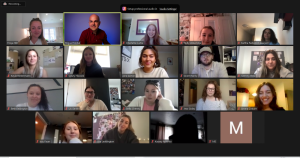
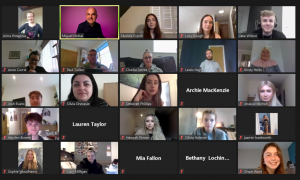
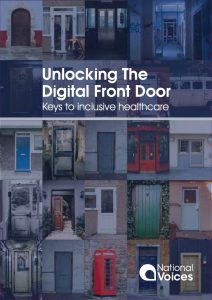
 gland ) Project Output (supporting mental health and wellbeing in India)
gland ) Project Output (supporting mental health and wellbeing in India) 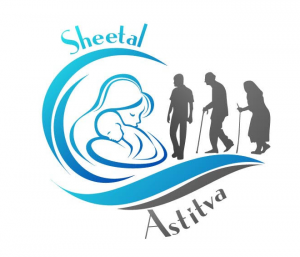
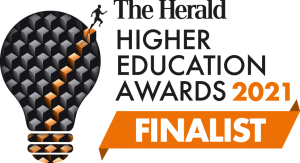 A collaborative project between Bournemouth University and the University of Strathclyde has been shortlisted at this year’s
A collaborative project between Bournemouth University and the University of Strathclyde has been shortlisted at this year’s  Writing about impact in a grant application can be challenging. However, a strong description of the benefits you hope your project will have on society and the economy, and the means you will take to get there, can make all the difference between getting funded or not.
Writing about impact in a grant application can be challenging. However, a strong description of the benefits you hope your project will have on society and the economy, and the means you will take to get there, can make all the difference between getting funded or not.

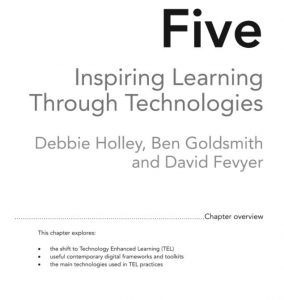
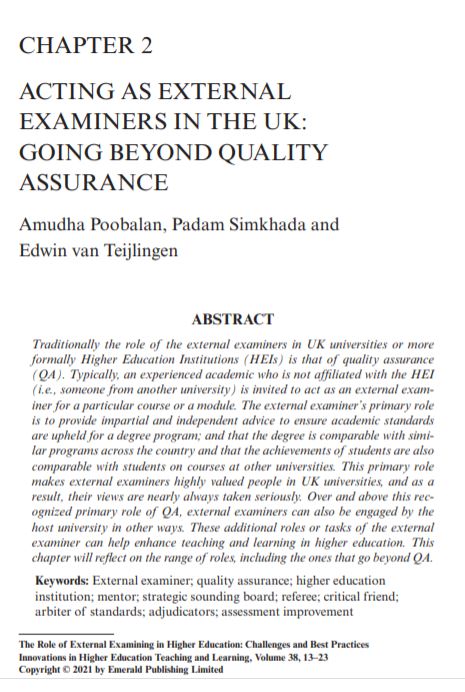


 Although ecosystem collapse could clearly have major implications for human society, it has only recently become the focus of scientific attention. I became interested in the topic through my research on ecosystems near to Bournemouth, specifically the New Forest National Park and the county of Dorset. In the New Forest, we found that the ancient beech woodlands are collapsing throughout the Park, which is having a devastating effect on the wildlife associated with them. The main cause appears to be climate change, although high herbivore pressure is adding to the problem. In Dorset, we found that a number of ecosystems have been dramatically transformed over the past 80 years or so. Back in the 1930s, there were extensive areas of species-rich chalk grassland, for example, which has now largely disappeared, owing to the spread of arable agriculture. So the problem of rapid environmental change is happening everywhere, including on our own doorstep here in Dorset.
Although ecosystem collapse could clearly have major implications for human society, it has only recently become the focus of scientific attention. I became interested in the topic through my research on ecosystems near to Bournemouth, specifically the New Forest National Park and the county of Dorset. In the New Forest, we found that the ancient beech woodlands are collapsing throughout the Park, which is having a devastating effect on the wildlife associated with them. The main cause appears to be climate change, although high herbivore pressure is adding to the problem. In Dorset, we found that a number of ecosystems have been dramatically transformed over the past 80 years or so. Back in the 1930s, there were extensive areas of species-rich chalk grassland, for example, which has now largely disappeared, owing to the spread of arable agriculture. So the problem of rapid environmental change is happening everywhere, including on our own doorstep here in Dorset.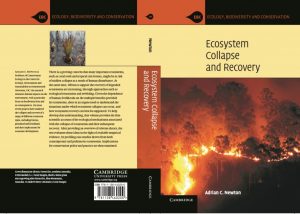











 Fourth INRC Symposium: From Clinical Applications to Neuro-Inspired Computation
Fourth INRC Symposium: From Clinical Applications to Neuro-Inspired Computation Writing policy briefs
Writing policy briefs Upholding Excellence: The Concordat to Support Research Integrity
Upholding Excellence: The Concordat to Support Research Integrity Today’s Documentation Will Serve Tomorrow’s Justice
Today’s Documentation Will Serve Tomorrow’s Justice ECR Funding Open Call: Research Culture & Community Grant – Application Deadline Friday 12 December
ECR Funding Open Call: Research Culture & Community Grant – Application Deadline Friday 12 December MSCA Postdoctoral Fellowships 2025 Call
MSCA Postdoctoral Fellowships 2025 Call ERC Advanced Grant 2025 Webinar
ERC Advanced Grant 2025 Webinar Horizon Europe Work Programme 2025 Published
Horizon Europe Work Programme 2025 Published Horizon Europe 2025 Work Programme pre-Published
Horizon Europe 2025 Work Programme pre-Published Update on UKRO services
Update on UKRO services European research project exploring use of ‘virtual twins’ to better manage metabolic associated fatty liver disease
European research project exploring use of ‘virtual twins’ to better manage metabolic associated fatty liver disease